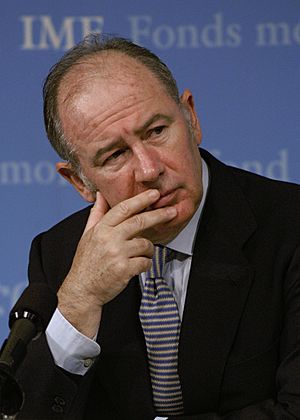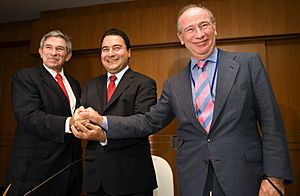Rodrigo Rato facts for kids
Quick facts for kids
Rodrigo Rato
|
|
|---|---|

Rato in 2004
|
|
| Managing Director of the International Monetary Fund |
|
| In office 7 June 2004 – 1 November 2007 |
|
| Preceded by | Horst Köhler |
| Succeeded by | Dominique Strauss-Kahn |
| First Deputy Prime Minister of Spain | |
| In office 3 September 2003 – 17 April 2004 |
|
| Prime Minister | José María Aznar |
| Preceded by | Mariano Rajoy |
| Succeeded by | María Teresa Fernández de la Vega |
| Minister of Economy of Spain | |
| In office 27 April 2000 – 17 April 2004 |
|
| Prime Minister | José María Aznar |
| Preceded by | Position established |
| Succeeded by | Pedro Solbes |
| Second Deputy Prime Minister of Spain | |
| In office 6 May 1996 – 4 September 2003 |
|
| Prime Minister | José María Aznar |
| Preceded by | Juan Antonio García Díez |
| Succeeded by | Javier Arenas |
| Minister of Economy and Finance of Spain | |
| In office 5 May 1996 – 27 April 2000 |
|
| Prime Minister | José María Aznar |
| Preceded by | Pedro Solbes |
| Succeeded by | Cristóbal Montoro (Finance) |
| Member of the Congress of Deputies | |
| In office 21 November 1989 – 12 May 2004 |
|
| Constituency | Madrid |
| In office 28 October 1982 – 21 November 1989 |
|
| Constituency | Cádiz |
| Personal details | |
| Born |
Rodrigo de Rato y Figaredo
18 March 1949 Madrid, Spain |
| Political party | People's Party |
| Spouse |
Alicia Gonzalez
(m. 2015) |
| Children | 3 |
| Relatives | Ramón Rato (Father) |
| Education | Complutense University University of California, Berkeley |
Rodrigo de Rato y Figaredo (born 18 March 1949) is a Spanish businessman and politician. He was a powerful figure in the Spanish government from 1996 to 2004. He later became the head of the International Monetary Fund (IMF), an organization that works to keep the world's economy stable.
Rato's career faced serious problems in 2015 when he was arrested. He was accused of serious financial wrongdoing. In 2017, a court found him guilty of misusing company money. He was sentenced to prison and began serving his time in October 2018.
Contents
Early Life and Schooling
Rodrigo Rato was born in Madrid, Spain, to a wealthy family that owned textile businesses. His family was well-known and had a history in both business and politics. Rato attended a Jesuit school called Our Lady of Remembrance College, Madrid.
For college, he studied law at the Complutense University of Madrid. After finishing his law studies, he moved to the United States. In 1974, he earned a Master of Business Administration (MBA) degree from the University of California, Berkeley.
Political and Business Career
Getting Started in Politics
In 1975, Rato started working in his family's businesses. These included a mineral water company and construction firms. He also helped expand his family's chain of radio stations.
In 1977, he joined a new political party called the Popular Alliance (AP). By 1981, he was one of the party's main leaders and their expert on the economy. In 1982, he was elected to the Congress of Deputies, which is part of Spain's parliament. He represented Cádiz until 1989 and then Madrid until 2000.
Rato became known for his strong opinions on how to manage the country's money. He was a close supporter of José María Aznar, who became the leader of the newly named People's Party (PP) in 1989.

A Top Minister in Spain's Government
In 1996, the People's Party won the general election, and José María Aznar became the Prime Minister of Spain. Rato was given two very important jobs. He became the Second Vice President and the Minister of Economy and Finance. This made him one of the most powerful people in the government.
During his time as minister, Rato helped manage Spain's economy. The People's Party won the election again in 2000 with an even bigger victory. Rato continued to serve as a top minister, focusing on the economy until 2004.
Leading the International Monetary Fund
On June 7, 2004, Rato took on a major international role. He became the Managing Director of the International Monetary Fund (IMF). The IMF is an organization of 190 countries that works to help the global economy grow and remain stable.
Rato led the IMF for over three years. In June 2007, he announced he would be leaving his position for personal reasons. His time as head of the IMF ended in October 2007.
Leading the Bankia Group
After leaving the IMF, Rato returned to the business world. In 2010, he became the president of Caja Madrid, a large savings bank. Later, Caja Madrid merged with six other banks to form a new company called Bankia, and Rato became its president.
However, Bankia soon faced major financial trouble. The Spanish government had to give the bank a large amount of money to keep it from failing. Because of these problems, Rato resigned as president of Bankia on May 7, 2012.
Legal Troubles and Prison
In 2012, Rato and 30 other former board members of Bankia were investigated for problems with the bank's financial records. It was discovered that Bankia's profits were not what they seemed. What was reported as a profit of €309 million in 2011 was later revealed to be a loss of €3 billion.
Later, it was revealed that Rato had used a secret company credit card for personal spending. On February 23, 2017, a court found him guilty of misusing company funds. He was sentenced to four and a half years in prison. The Supreme Court of Spain confirmed this decision, and Rato went to prison on October 25, 2018.
In a separate case, Rato was acquitted of other charges related to Bankia's troubles. In 2020, he was granted a semi-release, allowing him to serve the rest of his sentence with more freedom. However, in December 2024, he was sentenced to another four years in jail for other financial crimes. Rato said he would appeal this decision.
Personal Life
Rodrigo Rato married Alicia Gonzalez, a journalist, in 2015. He has three children from a previous marriage.
See also
 In Spanish: Rodrigo Rato para niños
In Spanish: Rodrigo Rato para niños
 | Frances Mary Albrier |
 | Whitney Young |
 | Muhammad Ali |

